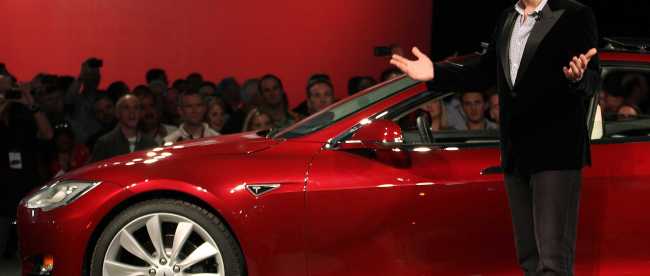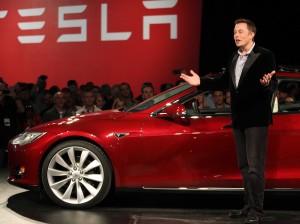Are State Franchise Laws Stunting Elon Musk’s Brainchild, Tesla Motors?

Tesla Motors released the world’s first luxury electric car in 2013: the Tesla Model S. The Model S won Motor Trend’s 2013 Car of the Year, and Motor Trend hailed the Model S as proof that America “can still make (great) things.”
Unfortunately, the franchise laws of at least 48 states ban or limit Tesla sales—get this—to prevent unfair competition. Franchise laws require automakers to sell their cars exclusively through dealership networks.
Tesla thinks the franchise model is as outdated as the internal combustion engine. Instead, Tesla sells its vehicles via the direct-to-consumer model, meaning no franchised dealerships or middlemen. Currently, you can only purchase a Tesla by phone or via the company’s website, and many states would like to keep it that way.
States Target Tesla
Tesla has faced bans in North Carolina, Minnesota, New York, Virginia, and Texas. The North Carolina Senate approved a bill, ultimately dropped by the North Carolina House of Representatives, forbidding non-dealership sales. In response to the bill’s death, Tesla executive James Chen said, “I think folks understood that this was an attack on the free market, that this would have precluded North Carolinians from having the freedom to choose the cars they wanted to purchase [and] the House leadership understood that.”
Speaking in support of the failed North Carolina law, Bob Glaser, head of the North Carolina Automobile Dealers Association, said, “It’s a consumer protection, and why we say that is a dealer who has invested a significant amount of capital in a community is more committed to taking care of that area’s customers.”
Franchise dealers made similar and ultimately unsuccessful efforts to block Tesla sales in Minnesota and New York.
The Virginia Department of Motor Vehicles, the Virginia Automobile Dealers Association, and Tesla recently reached an agreement to grant Tesla a single dealership license. In exchange for the license, Tesla agreed to withdraw a lawsuit it filed after the Department of Motor Vehicles rejected Tesla’s application for a dealership license.
Tesla has only lost its franchise law fight in one state:Texas. The Texas franchise statute is one of the toughest in the nation. Accordingly, at the two Tesla galleries in Texas, employees can’t offer you a test drive, reveal vehicle prices, or even provide the website address. Tesla CEO Elon Musk told Automotive News that Texas worded the statute “[l]ike Green Eggs and Ham, you know. If you’re a manufacturer, you cannot sell it any which way, no matter what. You can’t sell it in a house, can’t sell it in a mouse, can’t sell it in a grouse. It’s like, OK, wow. You can’t sell it.”
Who is Elon Musk, and why will he defeat the franchise laws?
Elon Musk, the founder of Tesla, is cool. No, seriously, he’s the real-world Iron Man. During the development stages of the Iron Man movie franchise, director Jon Favreau wasn’t sure how to bring Tony Stark, the main character/billionaire genius, to life. Robert Downey Jr., the actor playing Stark/Iron Man, suggested meeting with Musk for inspiration.
Musk didn’t disappoint, and I don’t think he’s capable of doing so.
Musk is a serial entrepreneur. At age 12, he wrote his first piece of software and sold it for $500. He left his home in South Africa and came to the United States—without parental approval—at age 17. In 1995, at age 24, Musk started a Ph.D. at Stanford in applied physics and material sciences—he dropped out after two days of class.
Instead of studying, Musk created Zip2 Corporation, a company that developed e-commerce publishing software. In 1999, Compaq bought Zip2 for around $300 million. Musk used some of his Zip2 wealth to build an online bank called X.com. X.com eventually became the world’s largest Internet-based payment system—PayPal. In 2002, Musk sold PayPal to eBay for $1.5 billion. As if that wasn’t enough, Musk founded SpaceX. SpaceX is the first private company to launch a rocket into space. One of Musk’s rockets recently supplied the International Space Station.
Pretty impressive. Franchise laws? I believe Musk will do what entrepreneurs do: innovate. Musk will find a way to innovate and render the franchise laws a non-issue.
Readers, are you ready to side with Musk and drive a Tesla?


This was very interesting. It seems like a senseless inefficiency, but I wonder how many jobs would be lost if we abandoned these franchise laws. Maybe we could carve out exceptions to franchise laws for manufacturers who produce their automobiles in the United States?
This fight is now playing out in Ohio: http://www.cnbc.com/id/101293416
To me, the Ohio dealerships’ argument that the franchise model is necessary for quality control makes no sense. Tesla’s vice president of regulatory affairs made a simple but effective argument: production and sale of Tesla cars fully comply with Ohio law.